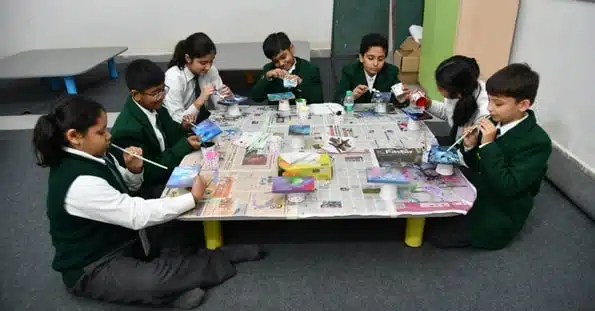When is Children’s Day: History, Significance & Celebration
Children’s Day is one of the happiest and most loved days for kids in India. It’s a day full of laughter, fun, and learning, reminding everyone of how important children are in our lives.
The day celebrates the joy of childhood and raises awareness about children’s rights, care, and education. Schools, parents, and communities all join in to make the day special for every child.
But have you ever wondered why we celebrate it and what it really means? Let’s look at the story behind this beautiful celebration and how it connects to our first Prime Minister, Pandit Jawaharlal Nehru, who believed that every child holds the nation’s future.
History of Children’s Day in India
In India, Children’s Day is celebrated on November 14, which marks Jawaharlal Nehru’s birthday. He was known as Chacha Nehru because of his great love and affection for children.
Before 1964, India celebrated Children’s Day on November 20, just like many other countries that follow Universal Children’s Day. However, after Nehru died in 1964, the Government of India decided to celebrate his birthday as Bal Diwas, to honor his deep concern and care for children’s growth and education.
The idea of celebrating this day began even earlier. In 1948, “Flower Day” was organized to raise funds for children affected by war. Later in 1951, social worker V. M. Kulkarni suggested that Nehru’s birthday could be used to raise awareness about child welfare in India.
Nehru agreed to the idea, and the day soon became popular across the country. Finally, on November 14, 1957, Children’s Day was officially declared a national celebration. The first celebration was held at the National Stadium in Delhi and was attended by thousands of smiling children.
Also Read: 12 Republic Day Activities For Students
Chacha Nehru and His Love for Children
When we talk about Children’s Day and Nehru, we remember how much he cared for young minds. Nehru always said that children are the future of the country, and the way we teach and raise them will decide the nation’s tomorrow. He believed that every child deserves a happy, safe, and educated childhood.
Children lovingly called him Chacha Nehru because he treated them with warmth and kindness. Wherever he went, children surrounded him with flowers and smiles, and he always made time to talk to them.
Nehru’s actions showed how much he valued education. He supported free primary education and better nutrition for students, and he founded the Children’s Film Society of India so kids could enjoy films made just for them. His love and belief in children’s power and imagination still inspire schools and families across the country.
Significance of Children’s Day in India
Children’s Day is more than just a fun day; it carries deep meaning. It reminds us that children are the heart of every nation.
1. Celebrating Childhood: The day celebrates the innocence, happiness, and creativity of children. It encourages them to express themselves freely and enjoy being kids.
2. Spreading Awareness: It helps people understand that every child deserves a safe home, good education, and protection from problems like child labour and abuse.
3. Promoting Education: Education was one of Nehru’s biggest dreams for India.. Children’s Day reminds us that learning should reach every child, no matter where they come from
4. Teaching Values: The day also gives parents and teachers a chance to teach values like kindness, honesty, and respect. These small lessons help children become better and more caring individuals.
In short, Children’s Day spreads love and awareness. It’s a reminder that children must be given the care and opportunities they need to grow strong and confident.
Also Read: Role of Community and Culture at DPS Gurugram
How is Children’s Day Celebrated in India?
Children’s Day is celebrated with great joy in schools and communities all over India.
In Schools:
Teachers organize special programs for students. There are dances, songs, plays, and fun games. Some schools even hold special performances by teachers, which children enjoy the most. Essay writing, drawing, and speech competitions are also held to help students express their thoughts.
In Communities:
Many NGOs and local groups arrange health camps, awareness drives, and activities about education and child safety. These programs help spread the message that every child deserves care and equal chances in life.
At Home:
Parents spend extra time with their children on this day. Families plan small celebrations, picnics, or fun games at home. It’s also a time for parents to talk to their children about kindness, gratitude, and responsibility.
Through these celebrations, the true message of Children’s Day spreads far and wide, that children should be loved, protected, and given the freedom to learn and grow happily.
Also Read: The Importance of Teaching Children Empathy and Compassion
Rights of a Child in India
A big part of learning about Children’s Day is understanding that it’s not only a festival, it’s also about ensuring children’s rights are respected. Children need protection, education, and care to grow well. Some important rights include:
1. Right to Survival: Every child has the right to live and be cared for, no matter their gender, background, or family situation. This means they must have access to proper food, shelter, and medical care from the very beginning of life. It ensures that every child gets a healthy start and a fair chance to grow.
2. Right to Education: Education is one of the most important rights for every child. It gives them the knowledge and skills they need to build a better future. All children between 6 and 14 years of age have the right to free and compulsory education in India.
3. Right to Protection: Every child should be safe from harm, neglect, and exploitation. This includes protection from child labour, trafficking, and any kind of abuse. It is the duty of adults, communities, and the law to ensure that children grow up in safe and caring surroundings.
4. Right to Development: Children grow not only physically but also mentally and emotionally. This right ensures that every child gets opportunities to learn, play, and develop their talents.
It also means that children should get good nutrition, healthcare, and support to become confident and capable individuals.
5. Right to Participation: Children have the right to share their views and ideas freely, especially on matters that affect their lives. Encouraging children to speak up helps them build confidence and understand responsibility from a young age.
6. Right to Health and Well-being: Every child deserves access to healthcare, clean water, and sanitation. Good health allows them to study, play, and grow without barriers. It also means protection against malnutrition and diseases through proper medical support.
7. Right to Identity: Each child has the right to a name and nationality. This gives them a legal identity and helps them access essential services like education and healthcare. Birth registration plays an important role in protecting this right.
8. Right to Equality and Non-Discrimination: Every child should be treated equally, regardless of their gender, religion, caste, or background. Discrimination takes away opportunities, so this right ensures that all children have a fair chance to learn and succeed.
9. Right to Expression: Children are full of imagination and creativity. This right allows them to express their thoughts and feelings freely, through speech, writing, art, or play, without fear or pressure.
10. Right to a Safe Environment: A clean, safe, and peaceful environment is essential for children’s growth. This right reminds us to protect nature, reduce pollution, and make sure that every child grows up in surroundings that support health and happiness.
Children’s Day reminds everyone—parents, teachers, and society—to respect and protect these rights so that every child can live a happy and meaningful life.
Also Read: Diversity and Inclusion: Celebrating Differences at DPS Gurugram
Things to Teach Kids on Children’s Day
Children’s Day isn’t just about fun and games. It is also a good time to teach children small but important life lessons.
1. Knowing Their Rights: Most importantly, teach children about their rights. They need to be aware of their right to education, safety, health, and equality. Help them understand that these rights belong to every child and must always be protected.
2. Kindness: Teach children to care for others and lend a helping hand when someone needs it.
3. Gratitude: Help kids appreciate what they have and say “thank you” often.
4. Respect: Encourage them to respect everyone, including friends, elders, and people from all backgrounds.
5. Responsibility: Teach them the importance of completing tasks and taking care of their belongings.
6. Confidence: Motivate them to believe in themselves and try new things without fear.
7. Care for the Environment: Explain how small actions like saving water or reducing waste can protect nature.
8. Digital Safety: Guide them to use the internet wisely and stay safe online.
Conclusion
Children’s Day is a day of love, learning, and laughter. It reminds us of Chacha Nehru’s dream of a nation built on education, equality, and care. More than just a celebration, it carries a message for every adult—to give children the time, love, and attention they deserve.
At Delhi Public School, Gurugram, these values are celebrated with great enthusiasm. The school organizes creative and fun-filled programs that help children learn and grow with confidence. DPS Gurugram nurtures young minds with kindness, knowledge, and encouragement, shaping the bright leaders of tomorrow.

